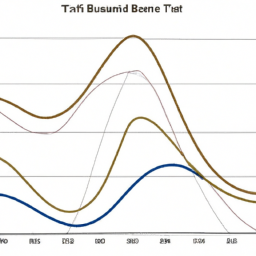Investing in bonds can be a wise decision for those seeking long-term financial stability. Bonds are a form of debt security, where an investor loans money to a government or corporation in exchange for regular interest payments and the return of the principal investment at maturity. Unlike stocks, which represent ownership in a company, bonds offer a fixed income stream and lower risk.
One of the main benefits of investing in bonds is their predictability. Unlike stocks, which can be volatile and unpredictable, bonds offer a stable income stream and a known return on investment. This makes them ideal for those seeking a reliable source of income, such as retirees or those saving for a specific goal.
There are several types of bonds, each with their own risk and rewards. Government bonds, also known as treasury bonds, are issued by the federal government and are considered very safe due to the government's ability to raise taxes and print money. Corporate bonds, on the other hand, are issued by companies and carry slightly more risk. Municipal bonds are issued by local governments and are exempt from federal taxes.
Investors can also choose between short-term and long-term bonds. Short-term bonds typically have a maturity of less than five years and offer lower returns, while long-term bonds can have maturities of 30 years or more and offer higher returns. It's important to consider your investment goals and risk tolerance when choosing between the two.
One of the main risk of investing in bonds is interest rate risk. When interest rates rise, the value of existing bonds decreases, as investors can now earn higher returns on new bonds. This can lead to a decline in bond prices and a decrease in the value of your investment. However, if you hold your bonds until maturity, you will receive the full principal amount regardless of any fluctuations in the market.
Another risk to consider is credit risk. This refers to the risk that the issuer of the bond will default on their payments, leaving the investor with a loss. Investors can mitigate this risk by investing in bonds with higher credit ratings or diversifying their bond portfolio across issuers and sectors.
When investing in bonds, it's important to have a strategy in place. This can include diversifying your portfolio across different types of bonds, maturities, and issuers. It's also important to consider the tax implications of your investments, as some bonds may be exempt from federal or state taxes.
Investors can also choose between individual bonds or bond funds. Individual bonds offer the potential for higher returns, as investors can hold the bond until maturity and receive the full principal amount. Bond funds, on the other hand, offer diversification and professional management, but may have higher fees and less control over the individual investments.
In recent years, bond yields have been low due to the Federal Reserve's policy of keeping interest rates low. This has led some investors to seek higher yields in risk investments, such as high-yield bonds or emerging market bonds. While these investments can offer higher returns, they also carry higher risk and may not be suitable for all investors.
In conclusion, investing in bonds can be a smart choice for those seeking long-term financial stability. Bonds offer a predictable income stream and lower risk than stocks, making them ideal for retirees or those saving for a specific goal. However, it's important to consider the risk and rewards of different types of bonds and to have a strategy in place to mitigate those risk. With careful consideration and planning, investing in bonds can help you achieve your financial goals.
